In recent years, North Carolina has implemented a number of policies to improve solid waste management, but some still say it has insufficient waste management infrastructure.
Blair Pollock, a solid waste planner for Orange County, said North Carolina is at the forefront of instituting recycling systems that are benefiting both the environment and the local economy.
“In the Southeast in particular, and in the Carolinas even more particular, you can be sure that all of the recyclables that you properly put in your recycling bin — not the crap like your red solo cup that’s not recyclable — but that empty, mind you empty, PET water bottle, that empty shampoo bottle, that DTH that you beautifully read and finished, that beer can that you drank all the beer out of and put in there," Pollock said. "All of those things are getting sold and recycled, and getting sold and recycled and made into new products, and mostly in this country, and even more particularly in the Carolinas.”
According to a recent report, contamination of recyclable materials in Orange County spans up to 10 percent, well below the national contamination rate of 25 percent. This success can be attributed to the numerous recycling educational outreach programs that Orange County provides.
“Getting it right on the front end is key to our collective success,” he said.
What happens when you recycle incorrectly at UNC?
UNC has implemented a number of successful initiatives to improve solid waste management. The University recovers about 7 percent more recyclable material than the national average.
BJ Tipton, the program manager at UNC’s Office of Waste Reduction and Recycling, said contamination rates of recycling on campus reveal that the community must increase its awareness of recycling guidelines. She said this is important in order to continue contributing to the North Carolina recycling industry and espousing sustainability.
She said the bins near UNC’s walkways are, on average, contaminated with 40 to 60 percent non-recyclable materials. If a recycling bin has a high rate of contamination, it will most likely be sent to the landfill. She said non-recyclable objects mixed in with recyclables can contaminate the entire batch of materials and may end up costing the recycling facility a lot of money and time.



